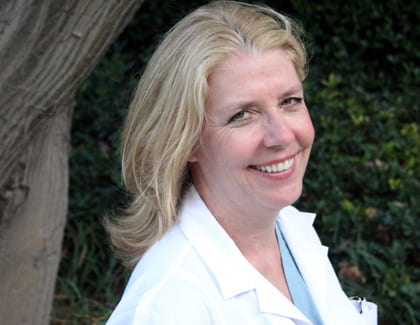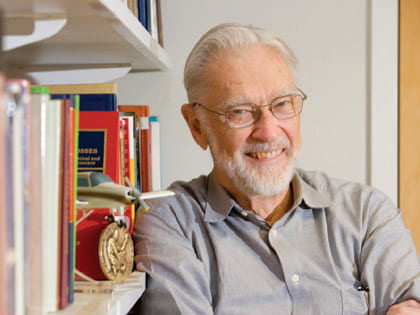In good hands
Caring nurses like Julia Rich have earned accolades for University of California, Irvine Healthcare

It’s the best part of Julia Rich’s job as a pediatrics nurse at UC Irvine Medical Center, when she’s called on to be the “backup baby cuddler.” She sits in a rocker, cradling a premature infant that fits snugly into her palms.
“You’re holding this baby to your heart and you’re thinking, ‘I can’t believe I’m getting paid for this. This is lovely,’” Rich says.
Nurses like Rich are the reason UC Irvine Medical Center was recently selected one of the “top hospitals” of Southern California in the first readers’ choice survey by ADVANCE for Nursesnewsmagazine. They’re also the reason the center has been designated as a Magnet facility by the American Nurses Credentialing Center for fostering excellence in nursing care. In addition to outstanding bedside care of patients, they excel at management and research.
“Nursing research is important to the Magnet program, and Julia is enthusiastic about research,” says Donna Grochow, clinical nurse and Magnet program manager. “She’s helped coordinate the baby grant, which is the first research project at UC Irvine funded by the National Institute of Nursing Research, a nursing section of the National Institute of Health.”
Cuddling preemies is one of Rich’s responsibilities as coordinator of the baby grant – or the study on Assisted Exercise in Prematurity. Led by pediatrics professor Dr. Dan Cooper, the study grew out of a clinical nurse project by another RN, Maria Coussens; it looks at how four weeks of daily exercise affects the growing bones and muscles of premature babies. Rich handles everything from filling out reams of paperwork required by the $2.7 million grant and monitoring the budget to making sure nurses have faithfully recorded details of the babies’ progress.
“Sometimes I have to play detective – when somebody forgets to jot down what the baby ate that day or which ultrasound was completed.”
Rich also pitches in for Coussens and Susan Gallitto, the RNs who exercise the preemies and cuddle the control group. It’s a radical premise – trying to improve the health of preemies the same way kids and adults do: by working out.
Lest one imagine baby treadmills, the exercises involve the tiniest, gentlest movement of the baby’s arms and legs.
“The babies seem to enjoy it,” Rich says, “although I’ve had a few princesses who did not want to be bothered.”
Sixteen babies, all between 30 and 33 weeks old, have completed the study so far.
“We’re collecting data that’s never been collected before, and it will have many useful applications,” she says. “If the study shows exercise is beneficial, we’d like to develop an exercise program that parents can do with their babies on an out-patient basis. This could lead to improved care of premature babies.”
Rich, whose father is a doctor and mother is a nurse, is working on her bachelor’s in nursing from Cal State University Fullerton. She came to UCI 20 years ago.
“UCI has a good culture for nurses – there’s abundant support,” she says. “Nurses here strive for excellence. It’s a strength of our leadership.”
